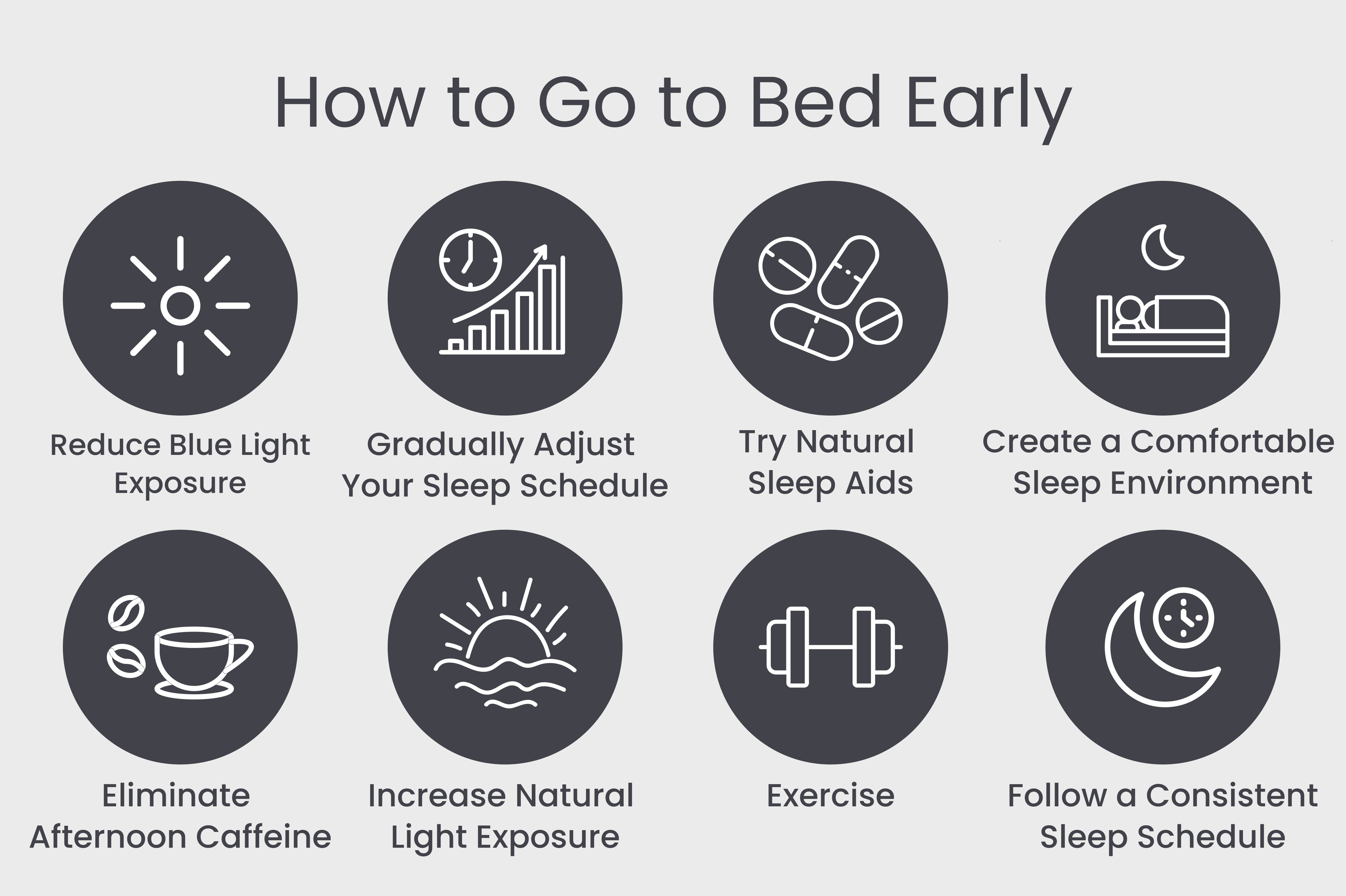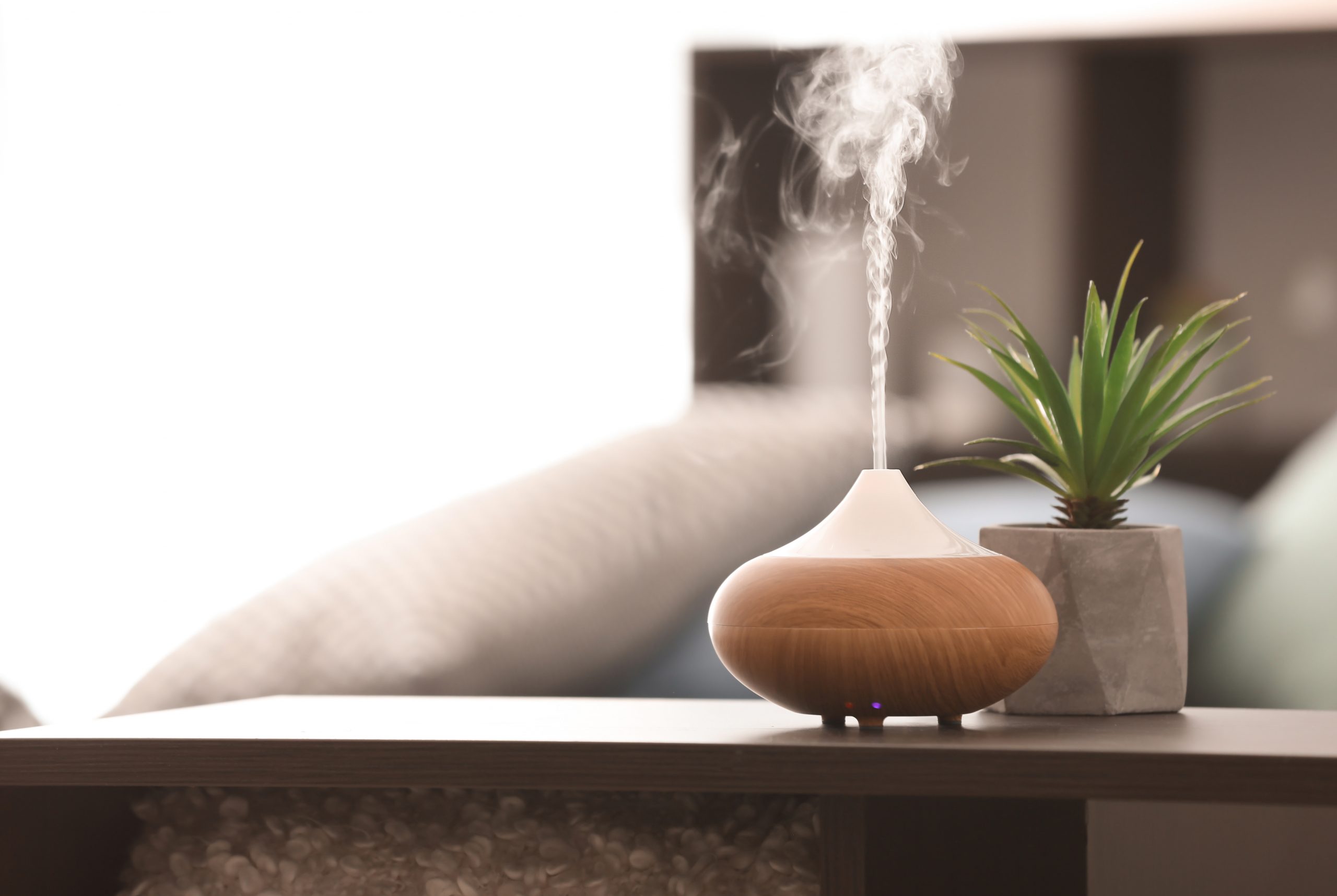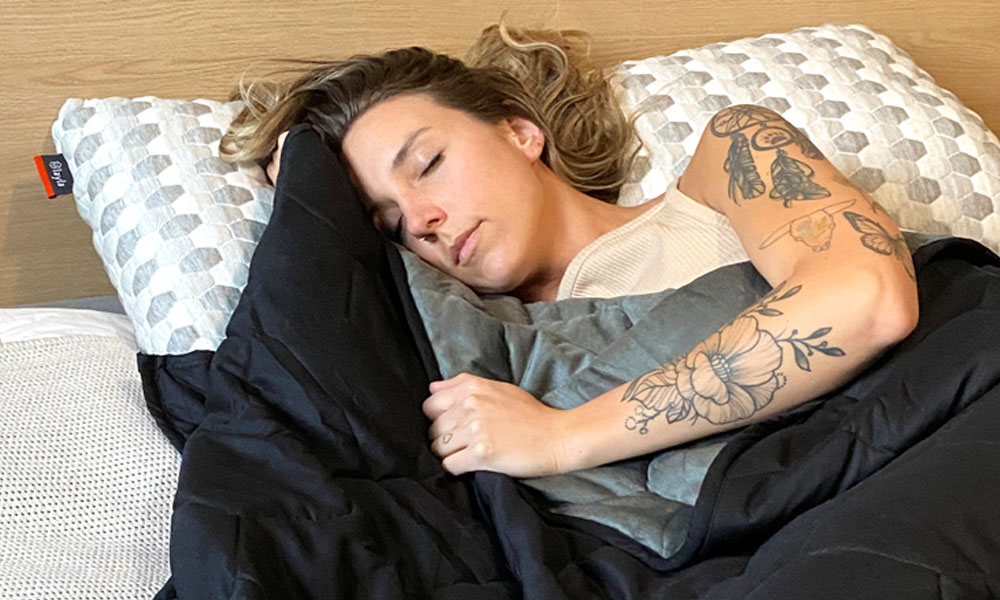To take control of your sleep and achieve the quality rest you deserve, keep reading to learn how to go to bed early.
Key Takeaways
- Gradually adjusting your bedtime in 15-minute increments can help your body adapt to an earlier sleep schedule
- Reducing blue light exposure 90 minutes before bed supports your natural circadian rhythm
- Creating an optimal sleep environment with proper bedding and temperature control enhances sleep quality
- Natural sleep aids like magnesium and melatonin can help regulate your sleep-wake cycle
- Consistent evening routines can help your body learn when it’s time to wind down and go to sleep

1. Reduce Blue Light Exposure
Your circadian rhythm, which is the internal 24-hour clock that regulates sleep cycles, relies heavily on environmental cues, particularly light exposure. Modern electronics emit blue light that disrupts this natural process by suppressing melatonin production, making it harder to go to bed early.
Research shows that blue light exposure in the evening can delay sleep onset by up to 2 hours. Avoid using devices like smartphones or televisions at least an hour and a half before your intended bedtime to combat this effect. Ways to reduce blue light exposure include:
- Switching phones and tablets to night mode
- Using blue-light-blocking glasses if screen use is unavoidable
- Replacing bright overhead lights with warm, dim lighting
- Consider red light therapy in the evening, which has minimal impact on melatonin production
2. Gradually Adjust Your Sleep Schedule
One common mistake when learning how to go to bed earlier is attempting a dramatic change too quickly. Instead of forcing yourself to sleep hours earlier than usual, you should gradually adjust your sleep schedule.
Start by shifting your bedtime to 15 minutes earlier every few days. For example, if you typically go to sleep at midnight but want to sleep at 10:30 PM, follow these adjustments to your sleep schedule:
- Week 1: Target 11:45 PM
- Week 2: Move to 11:30 PM
- Week 3: Aim for 11:15 PM
- Week 4: Reach for a bedtime of 11:00 PM
- Week 5: Go to sleep at 10:45 PM
- Week 6: Reach your goal of 10:30 PM
This method allows your body to adapt naturally, making your sleep schedule more manageable and sustainable.
3. Try Natural Sleep Aids
When learning how to go to sleep earlier, natural sleep aids can provide gentle support without the side effects of prescription medications. Here are several evidence-based options:

- Aromatherapy: At least one review of 12 studies on aromatherapy and sleep found that using essential oils can improve sleep quality. Lavender is particularly good at helping people fall asleep. If you’re trying to figure out how to go to bed early, an oil diffuser in your bedroom is a great alternative. Just a few drops of oil will fill the area around your bed with soothing scents that ease your mind to sleep.
- Melatonin: Your body naturally produces melatonin to regulate sleep-wake cycles, but sometimes, you might need additional support in the form of a supplement. Melatonin lasts just a few hours, so it’s gentle enough to help you fall asleep but shouldn’t make you feel groggy in the morning.
- Magnesium: Research shows magnesium may support sleep regulation. Consider using magnesium oil spray for sleep, which can be absorbed through the skin. Alternatively, increase your intake of magnesium-rich foods.
- Herbal teas: Traditional herbal remedies like chamomile and valerian root tea may help promote relaxation and prepare your body for sleep. These caffeine-free options are particularly effective when incorporated into a consistent bedtime routine.
4. Create a Comfortable Sleeping Environment
If you want to sleep well, you need a good sleep environment. A supportive memory foam mattress provides the comfort and pressure relief needed for quality rest, helping you fall asleep faster and maintain better sleep throughout the night. To create the optimal sleep environment:
- Invest in a quality mattress that supports proper spinal alignment and promotes temperature regulation
- Choose comfortable, breathable bedding that helps maintain an ideal sleeping temperature
- Eliminate noise and distractions with white noise or sound machines
- Maintain your bedroom temperature between 65-68°F (18-20°C) for optimal sleep conditions
5. Eliminate Afternoon Caffeine

Drinking a cup of coffee in the morning or tea in the afternoon might perk you up, but caffeine and sleep don’t mix. Research shows that caffeine has a half-life of approximately 5 to 6 hours, meaning that half of the caffeine you consume remains in your system for several hours after consumption. Even small amounts of caffeine can make it difficult to fall asleep on time.
Establish a caffeine cutoff time at least 6-8 hours before bedtime to optimize your sleep schedule. While morning coffee consumption is generally fine, consuming caffeinated beverages like coffee, tea, or energy drinks in the afternoon can significantly impact your ability to fall asleep early. Consider switching to decaffeinated alternatives after 2 PM to protect your sleep quality.
6. Try to Get More Daily Natural Light
Have you ever realized how much easier it is to wake up when there’s natural light in your room? Natural light directly controls your sleep-wake cycle. Sunlight helps synchronize your circadian rhythm, promoting healthy melatonin production patterns.
Regular exposure to natural daylight, particularly in the morning hours, strengthens your body’s natural sleep-wake signals. Even brief periods of outdoor light exposure can make a significant difference if you spend most of your day indoors. Studies indicate that natural light exposure during the day can improve nighttime sleep quality and help you go to bed early.
7. Exercise
Physical activity is one of the best ways to naturally adjust your sleep schedule. Research shows that moderate exercise can reduce the time it takes to fall asleep.
For some people, exercising before bed can increase alertness, which makes it challenging to relax and fall asleep. To avoid disrupting your sleep, try completing your workouts at least 3-4 hours before your intended bedtime. This gives your body enough time to cool down and return to a restful state.
8. Follow a Consistent Sleep Schedule
A consistent sleep schedule trains your mind and body to go to bed at a desired time. Research shows that consistent bedtime routines signal your brain to begin preparing for sleep. Create a relaxing pre-bed routine by incorporating these evidence-based activities:
- Evening meditation: Take 10-15 minutes to practice meditation for sleep, helping quiet your mind and reduce racing thoughts before bed.
- Reading session: Choose a physical book rather than an e-reader, as the activity helps tire your eyes naturally while avoiding blue light exposure.
- Journaling: Spend a few minutes writing down tomorrow’s tasks or processing today’s thoughts to clear your mind before sleep.
- Calming audio: Listen to soft music, natural sounds, or a relaxing playlist for sleep at a low volume to help your brain transition into a more relaxed state.
- Gentle movement: Perform light stretching or yoga poses to release physical tension without elevating your heart rate.
- Warm bath or shower: Taking a warm shower about an hour before bed helps trigger your body’s natural cool-down process for sleep.
- Breathing exercises: Practice deep breathing patterns to activate your parasympathetic nervous system and prepare for rest.
Choose a few of these activities and perform them in the same order each night. This nightly process can help your body naturally recognize these actions as signals that it’s time to wind down for sleep.
Frequently Asked Questions
Why is it hard to go to sleep early?
Going to sleep early can be challenging, primarily because of your chronotype—your body’s natural sleep preference. There are four main chronotypes: bears (the most common, following the solar cycle), lions (early risers), wolves (night owls), and dolphins (light sleepers with irregular patterns).
If you’re naturally a wolf chronotype, for example, your body is programmed to feel most alert in the evening hours, making early bedtimes more difficult.
Beyond your chronotype, modern lifestyle factors, such as work schedules, family responsibilities, artificial light exposure, and stress levels, can all impact your ability to fall asleep early.
What are the benefits of going to sleep early?
Going to bed early improves many aspects of your health and daily life:

- Better sleep quality: Earlier bedtimes align with your body’s natural circadian rhythm, leading to more restorative and deep sleep.
- Improved morning routine: Waking up refreshed gives you quiet, uninterrupted time to exercise, plan your day, or enjoy peaceful moments before the world gets busy.
- Healthier eating habits: Early sleepers tend to maintain more regular meal times and make better food choices throughout the day.
- Improved mood: Consistent early sleep schedules help stabilize emotions and reduce irritability. Studies have shown that waking up earlier may reduce the risk of depression.
- Reduced risk of chronic health issues: Going to bed early helps promote deep sleep, which may protect against various health conditions. Quality sleep supports your immune system, heart health, and overall physical well-being.
How many hours of sleep do I need when going to bed early?
So, how much sleep do you need when going to bed early? Sleep needs vary significantly throughout your life. While adults generally need 7-9 hours of sleep per night, children and teenagers require several more hours to support growth and development. Seniors often find they need slightly less, sometimes functioning well on 7-8 hours of rest.
Wrapping Up: How to Go to Sleep Earlier
Transitioning to an earlier sleep schedule takes time and dedication, but the benefits are worth it. Remember that everyone’s sleep needs are different, and it may take some time to find the routine that works best for you. Start by making small adjustments to your schedule and gradually building habits that support your goal of going to bed early.
Browse Layla Sleep’s selection of mattresses, pillows, and bedding to find the right products for your sleep needs.



